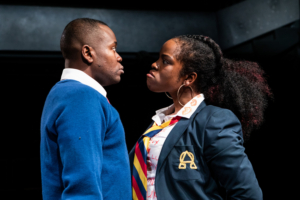Review: LITTLE BABY JESUS, Orange Tree Theatre

![]() When does a teenager become an adult? Is there an exact moment or event that shapes us into what we become and how much is our quest to fit in, a help or hindrance? Set in inner-city London, Arinze Kene's play Little Baby Jesus follows the pleasures and pain of three teenagers as they pinpoint moments when they enter into their adult lives.
When does a teenager become an adult? Is there an exact moment or event that shapes us into what we become and how much is our quest to fit in, a help or hindrance? Set in inner-city London, Arinze Kene's play Little Baby Jesus follows the pleasures and pain of three teenagers as they pinpoint moments when they enter into their adult lives.
We read a lot about today's disenfranchised youth, but here Kene creates characters that feel authentic and real. On one hand this is a brilliantly realistic slice of the lives of a specific group of young black Londoners, but on the other, it shows universal stories of the nuances and dramas of growing up.
Calm and gentle Kehinde is mature and wise beyond his years, but he can't seem to rationalise the betrayal of his values in the face of peer pressure. Joanne is full of bravado and attitude, hiding her struggle to cope with her mother's mental illness and her feeling of abandonment. Rugrat is the clown and loudmouth who will probably fail to achieve anything, but deep down, all he wants is to fit in.
Seemingly small events are pivotal to these young people; Kehinde fails to defend his sister when she beats the fastest boy in the year in a race. Joanne spends an age describing the events surrounding a carpet getting stuck in the washing machine in the laundrette that she works at. Rugrat is beside himself with excitement as he recalls the build-up to a school fight.
Kene uses a trio of intercutting monologues to realise these stories in a lyrical and often poetic manner. The rhythm of the street parlance and slang is magnetic. Stories overlap and often do not reach a conclusion; there are some frustratingly tantalising elements hinted at, but not developed. It feels like neat conclusions are not really the point of the play and this method is actually a very realistic reflection of the jumbled and chaotic mind of teenagers. However, both acts could do with trimming and the second half lacks some coherence.
What makes you forgive these downsides are the actors, who are all exceptional in their energy and engagement. Anyebe Godwin is balanced and earnest as Kehinde, with a blizzard of regret and sadness at his failure as a brother. Rachel Nwokoro is a fiery mass of anger, frustration and sadness as Joanne. She has a rawness to her swagger as Nwokoro reveals tinges of the vulnerability under the attitude. Khai Shaw is given less depth to his character as Rugrat, but is excellent at showing the frenzied and discouraged boy who lacks any direction.
All three, but particularly Nwokoro, interact with the audience constantly. They are also incredibly skillful at instantly snapping into the other characters within their stories. Shaw is most adaptable as the laid-back skinny boy who finally extracts the carpet from Joanne's washing machine and the school gang leader Pierre Cunningham, among many others.
2019 JMK award-winner Tristan Fynn-Aiduenu directs with huge dynamism and confidence. He makes use of every side of the theatre and ensures the energy never dips. Less successful are the short sequences in the second half when Rugrat stands at two corners of the balcony to represent a bridge; Fynn-Aiduenu's decision is logical, but audience sightlines are just too compromised.
Nicola Chang's sound design and Bethany Gupwell's lighting both complement the ebb and flow of the production, with an inventive soundtrack of loud music and subtle sound effects. The vibrant lighting relies hugely on the large circular hoop of light that hangs over the cast at all times, dramatically reminiscent of giant halo.
This is an intense, visceral and vivid portrayal of the often-brutal reality of growing up. It feels starkly authentic and cruel, whilst at times is wildly funny and is all the more appealing for it.
Little Baby Jesus is at the Orange Tree Theatre until 16 November
Photo Credit: Ali Wright
Reader Reviews

Videos

